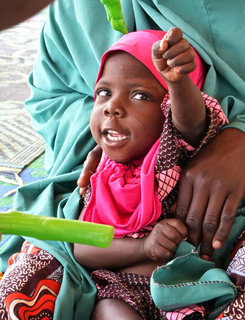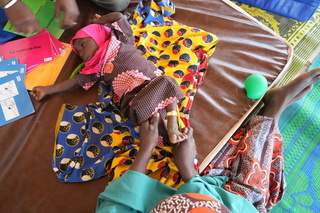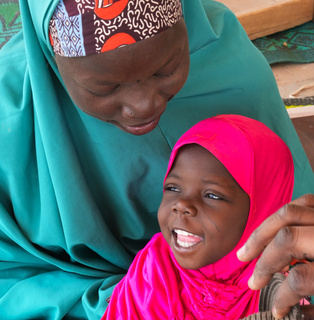Massalouka's smile lights up the room as she grabs the toy handed to her by HI's physiotherapist. A real victory for this little girl who suffered from severe malnutrition that left her with developmental delays. HI is helping her with stimulation therapy sessions – play-based rehabilitation care for malnourished children.
The terrible consequences of malnutrition
 Massalouka comes from a large family: she has three brothers and fifteen half brothers and sisters. Her mother, Manssoura Larwane, hugs her tightly as she recalls how it all began.
Massalouka comes from a large family: she has three brothers and fifteen half brothers and sisters. Her mother, Manssoura Larwane, hugs her tightly as she recalls how it all began.
"When she was only six months old, Massalouka contracted a serious form of malaria, followed by very severe diarrhoea that left her completely dehydrated. In the days that followed, I noticed that she was losing energy and that it was affecting her psychomotor development," explains Manssoura, who still shudders at the memory of it.
The little girl started to lag behind the other children and her parents were very worried about her. She couldn’t pick up objects or roll over on her own. The consequences of malnutrition became even more apparent as her shoulders and arms began to buckle.
Family life turned upside down
 Massalouka's parents were devastated. They worried about their daughter constantly and their day-to-day life was seriously affected, with the whole family focused on Massalouka needs. Manssoura had to carry her daughter on her back all the time to prevent her from hurting herself and ended each day in pain. Always on the alert, she had no time for shopping, cooking or cleaning. Her sons suffered, because all of their mother’s attention was on Massalouka.
Massalouka's parents were devastated. They worried about their daughter constantly and their day-to-day life was seriously affected, with the whole family focused on Massalouka needs. Manssoura had to carry her daughter on her back all the time to prevent her from hurting herself and ended each day in pain. Always on the alert, she had no time for shopping, cooking or cleaning. Her sons suffered, because all of their mother’s attention was on Massalouka.
In the mornings, it was her father's turn to take care of Massalouka. Worried about his daughter, he would often arrive late in the fields or at the stall where he sold snacks, and would spend his days thinking about her, neglecting his crops or his customers and hurrying home in the evening. So, when Manssoura heard about HI's stimulation therapy sessions, she jumped at the opportunity.
"My neighbour told me about HI's stimulation therapy sessions because she had been going with her son and he could now sit up on his own. So when she suggested I go with her, I didn't hesitate. The first thing I noticed when I arrived was how many children there were. You could hear shouts and laughter everywhere," says Manssoura.
Massalouka’s triumph
Manssoura has to walk more than ten kilometres with her daughter on her back to reach the health centre where HI is running the stimulation therapy sessions. They have been attending together for a few months now and the little girl’s progress is spectacular! She now has better control of her head and she is beginning to reach for things. She can roll over when she is lying down and can sit up unaided.
HI’s teams have also taught Manssoura exercises that she can do with her daughter at home. Simple mobilisations of her hands and arms or exercises to help her control her head, so that Massalouka can continue making progress in her own environment. Today, Massalouka is a little girl who radiates joy.
"Now that she can sit up and grab things, Massalouka is much more independent. When I leave her with her toys, she can keep herself busy for a little while. Her father can concentrate on his work again, her brothers on their activities and I have more time to take care of our home," says Manssoura.
 Manssoura’s dream is that, one day, with the help of the stimulation therapy sessions, Massalouka will be able to run on her own two feet and play with the other children. You only have to look at the little girl's infectious smile and boundless energy to know that, when that happens, there will be no stopping her!
Manssoura’s dream is that, one day, with the help of the stimulation therapy sessions, Massalouka will be able to run on her own two feet and play with the other children. You only have to look at the little girl's infectious smile and boundless energy to know that, when that happens, there will be no stopping her!
Play as a therapeutic tool
Stimulation therapy is provided by HI to support the development of children who have suffered the consequences of malnutrition. Play is a therapeutic tool that allows physiotherapists to stimulate the children's interest and encourages them to perform movements that help their physical and psychomotor development.
Maradi, despite being the economic capital of Niger, is one of the regions most affected by malnutrition. The causes are varied, ranging from inadequate or late treatment of children when they fall ill to a lack of knowledge about good feeding practices and the nutritional qualities of food. Finally, the consequences of climate change also play a role, generating episodes of drought or flooding that can destroy crops and lead to poor harvests.
To address this issue, HI has been running a rehabilitation and stimulation therapy project for malnourished children in the Maradi region since 2022. The project is due to run until 2026. Since the launch of these activities, HI has accompanied more than 1,300 children in group and individual sessions, provided 30 health centres with adapted equipment, trained 100 health professionals and raised awareness among more than 2,800 parents. By the end of the project, some 30,000 children will have benefited from rehabilitation care adapted to their needs, and some 60,000 parents from awareness raising. These activities have been made possible thanks to the support of the DGD.


 Massalouka comes from a large family: she has three brothers and fifteen half brothers and sisters. Her mother, Manssoura Larwane, hugs her tightly as she recalls how it all began.
Massalouka comes from a large family: she has three brothers and fifteen half brothers and sisters. Her mother, Manssoura Larwane, hugs her tightly as she recalls how it all began. Massalouka's parents were devastated. They worried about their daughter constantly and their day-to-day life was seriously affected, with the whole family focused on Massalouka needs. Manssoura had to carry her daughter on her back all the time to prevent her from hurting herself and ended each day in pain. Always on the alert, she had no time for shopping, cooking or cleaning. Her sons suffered, because all of their mother’s attention was on Massalouka.
Massalouka's parents were devastated. They worried about their daughter constantly and their day-to-day life was seriously affected, with the whole family focused on Massalouka needs. Manssoura had to carry her daughter on her back all the time to prevent her from hurting herself and ended each day in pain. Always on the alert, she had no time for shopping, cooking or cleaning. Her sons suffered, because all of their mother’s attention was on Massalouka. Manssoura’s dream is that, one day, with the help of the stimulation therapy sessions, Massalouka will be able to run on her own two feet and play with the other children. You only have to look at the little girl's infectious smile and boundless energy to know that, when that happens, there will be no stopping her!
Manssoura’s dream is that, one day, with the help of the stimulation therapy sessions, Massalouka will be able to run on her own two feet and play with the other children. You only have to look at the little girl's infectious smile and boundless energy to know that, when that happens, there will be no stopping her!

